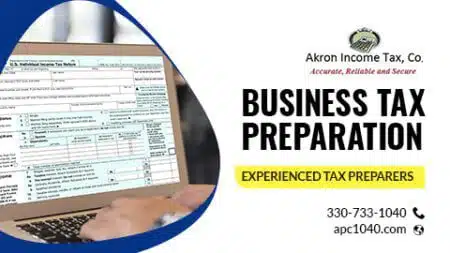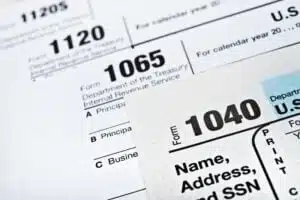Starting and running a small business comes with a myriad of responsibilities, and one crucial aspect is managing small business taxes based on your business structure and business type. Taxes can be a complex and daunting topic for entrepreneurs, but understanding the basics is essential for compliance and financial health. From income tax to sales tax, and payroll tax, each type has its own set of rules, filing deadlines, and deadlines that need to be adhered to.
At Akron Income Tax Co, we recognize that navigating the tax landscape can be challenging for small business owners. That’s why we offer filing business taxes at reasonable fees. Our team is dedicated to helping you understand your tax obligations and ensure your business remains compliant.
Several Different Categories
Small business taxes encompass various categories, including the general types of business taxes like federal, state, and local taxes. Each category has specific requirements and payment schedules. For instance, federal taxes include income tax, self-employment tax, and employer payroll tax, which are calculated based on personal income. Additionally, the capital gains tax rate may apply if business investments appreciate or assets are sold for profit. State and local taxes may involve sales tax, property tax, and state income tax. It’s crucial to differentiate between these taxes to avoid penalties and interest charges.
Moreover, understanding the importance of proper tax documentation cannot be overstated. Keeping meticulous records of your business transactions, expenses, and mortgage interest income will not only help during tax season but also provide a clear financial picture of your business. This practice can aid in identifying potential deductions and credits related to Schedule C, ultimately reducing your tax liability.
As you delve into the various aspects of small business taxes, remember that seeking professional assistance can be invaluable. Akron Income Tax Co is here to support you every step of the way. Contact us today to learn how we can help you manage your taxes efficiently and effectively.
Types of Small Business Taxes
Understanding the different types of small business taxes is essential for staying compliant and managing your financial responsibilities effectively. Here are the primary categories of taxes that small businesses typically encounter:
- Income Tax: This is a tax on the profits of your business. If your business is a sole proprietorship, partnership, or an S corporation, the income is usually passed through to the owners and reported on their personal tax returns.
- Self-Employment Tax: Sole proprietors, partners, and LLC members often have to pay self-employment tax, which covers Social Security and Medicare taxes.
- Payroll Tax: If you have employees, you need to withhold federal and state income taxes, Social Security, and Medicare taxes from their wages. Additionally, you are responsible for paying the employer’s share of Social Security and Medicare taxes.
- Sales Tax: Depending on your state and local laws, you may need to collect sales tax on the goods and services you sell. This tax is then remitted to the appropriate tax authority.
- Excise Tax: This tax applies to specific types of businesses and products, such as alcohol, tobacco, and fuel. The rates and regulations vary depending on the product and jurisdiction.
- Property Tax: If your business owns real estate, you’ll need to pay property taxes to your local government. The amount is usually based on the assessed value of the property.
Different Rules
Each type of tax, including federal income tax for C corporations, requires businesses to have an employer identification number (EIN) and has its own set of rules, deadlines, and forms, including the federal income tax return and the information return that need to be filed. Missing a deadline or improperly filing a tax form can result in penalties and interest charges, which can be costly for small businesses. It’s crucial to stay organized and keep up-to-date with the latest tax laws and regulations to ensure your business remains compliant.
By understanding the various types of small business taxes, you can better prepare and manage your tax obligations, allowing you to focus more on growing your business and less on worrying about tax issues.
Key Tax Deadlines for Small Businesses
For small business owners, keeping track of key tax deadlines is crucial to avoid penalties and ensure compliance. Here are some of the most important deadlines you need to be aware of:
- January 31: This is the deadline for sending out W-2 forms to your employees and 1099 forms to independent contractors. You must also file these forms with the Social Security Administration by this date.
- March 15: If your business is a partnership or S corporation, this is the deadline to file your annual tax returns using Form 1065 or Form 1120S, respectively. You may also request an extension by filing Form 7004.
- April 15: This is the deadline for filing individual income tax returns, which includes sole proprietors and single-member LLCs. If you need more time, you can file for an extension using Form 4868. Additionally, this is the first quarterly estimated tax payment due date.
- June 15: This is the due date for the second quarterly estimated tax payment. It’s essential to calculate these payments accurately to avoid underpayment penalties.
- September 15: The third quarterly estimated tax payment is due on this date. Also, if you filed for an extension for your partnership or S corporation, this is the deadline to submit your completed tax return.
- October 15: This is the extended deadline for individual tax returns if you filed for an extension in April. Ensure all your information is accurate and complete to avoid any issues.
- January 15 of the following year: This is the deadline for the fourth quarterly estimated tax payment.
In addition to these federal deadlines, you should also be aware of any state-specific tax deadlines that may apply to your business. Staying organized and keeping a detailed calendar of these key dates can help you avoid missing any important deadlines.
By proactively managing your tax deadlines, you can minimize stress and ensure that your business remains in good standing with tax authorities. Timely filing and payment of taxes also help avoid costly penalties and interest charges.
Tax Deductions and Credits for Small Businesses
Understanding tax deductions and credits available to small businesses can significantly reduce your tax liability and save you money. Here are some of the common deductions and credits you should be aware of:
- Business Expenses: Ordinary and necessary expenses related to operating your business, such as office supplies, utilities, and rent, are deductible. Keeping detailed records of these expenses is essential for maximizing your deductions.
- Home Office Deduction: If you use part of your home exclusively for business purposes, you may qualify for a home office deduction. This includes a portion of your rent or mortgage, utilities, and home maintenance costs.
- Vehicle Expenses: If you use your vehicle for business purposes, you can deduct either the actual expenses incurred (like gas, maintenance, and insurance) or use the standard mileage rate set by the IRS.
- Employee Salaries and Benefits: Wages paid to employees, as well as contributions to employee benefit programs like health insurance and retirement plans, are deductible.
- Depreciation: You can deduct the cost of buying business assets, such as equipment and furniture, over the useful life of the asset through depreciation. The IRS provides specific guidelines on how to calculate these deductions.
- Qualified Business Income (QBI) Deduction: This allows eligible small businesses to deduct up to 20% of their qualified business income. This deduction was introduced as part of the Tax Cuts and Jobs Act and can provide substantial tax savings.
- Research and Development (R&D) Tax Credit: If your business invests in research and development activities, you may qualify for the R&D tax credit. This credit can offset some of the costs associated with innovation and development.
- Work Opportunity Tax Credit (WOTC): This credit is available for businesses that hire individuals from certain targeted groups, such as veterans or individuals who have faced significant barriers to employment.
It’s important to consult with a tax professional to ensure you are taking full advantage of all available deductions and credits. Properly documenting your expenditures and maintaining accurate records can help you maximize your savings and reduce your tax burden.
By leveraging these tax benefits, you can invest more resources back into your business, fostering growth and profitability.
Common Mistakes to Avoid in Small Business Taxes
Filing taxes as a small business owner can be complex, and even minor errors can lead to significant issues, including penalties and audits. Here are some common mistakes to avoid to ensure your tax filing process goes smoothly:
- Mixing Personal and Business Expenses: One of the most frequent errors is not keeping personal and business expenses separate. This can complicate your bookkeeping and make it difficult to track deductible expenses accurately.
- Failing to Keep Accurate Records: Inadequate record-keeping can lead to missed deductions and credits. It’s essential to maintain detailed and organized records of all business transactions, including receipts, invoices, and bank statements.
- Missing Deadlines: Not filing or paying taxes on time can result in penalties and interest charges. Be aware of all relevant tax deadlines, including estimated tax payments, and ensure you submit your returns promptly.
- Misunderstanding Tax Obligations: Different types of businesses have different tax requirements. Ensure you understand your specific tax obligations, including payroll taxes, sales taxes, and self-employment taxes, to avoid underpayment or non-compliance.
- Incorrectly Classifying Workers: Misclassifying employees as independent contractors can lead to significant tax liabilities and penalties. Ensure you correctly classify your workers according to IRS guidelines.
- Overlooking Deductions and Credits: Small businesses often miss out on valuable deductions and credits due to lack of knowledge. Stay informed about the deductions and credits available to your business to maximize your tax savings.
- Not Consulting a Tax Professional: Attempting to handle your taxes without professional assistance can result in mistakes. A tax professional can provide valuable advice and ensure your taxes are filed correctly.
- Ignoring Estimated Tax Payments: If you expect to owe at least $1,000 in taxes, you may be required to make quarterly estimated tax payments. Ignoring this obligation can result in penalties and interest.
Avoiding these common mistakes can help you stay compliant with tax regulations and optimize your tax liability. By being proactive and diligent in your tax preparation, you can minimize risks and focus more on growing your business.
Tips for Efficient Small Business Tax Management
Managing taxes efficiently is crucial for the sustainability and growth of any small business. Here are some effective tips to help you handle your small business taxes more efficiently:
- Stay Organized: Keep all your financial documents organized and readily accessible. Use accounting software to track your income and expenses, and regularly update your records to avoid last-minute scrambling.
- Understand Tax Deductions: Familiarize yourself with the tax deductions available to your business. Common deductions include office expenses, travel, and certain utilities. Properly documenting these expenses can significantly reduce your tax liability.
- Plan for Quarterly Taxes: If you expect to owe more than $1,000 in taxes, you must make quarterly estimated tax payments. Plan for these payments to avoid penalties and ensure you have sufficient funds set aside.
- Hire a Professional: A tax professional can provide invaluable guidance, help you identify deductions, and ensure your taxes are filed correctly. Their expertise can save you time and money in the long run.
- Keep Up with Tax Law Changes: Tax laws can change frequently. Stay informed about any updates or changes that may affect your business to ensure compliance and take advantage of new tax benefits.
- Separate Business and Personal Finances: Maintain separate bank accounts for your business and personal finances. This makes it easier to track business expenses and simplifies your tax filing process.
- Review Your Tax Strategy Annually: Regularly review your tax strategy with your accountant or tax advisor. This helps identify areas for improvement and ensures your tax planning aligns with your business goals.
- Set Aside Funds for Taxes: Regularly set aside a portion of your income for tax payments. This helps prevent cash flow issues and ensures you’re prepared when tax payments are due.
By implementing these tips, you can manage your small business taxes more efficiently, reducing stress and optimizing your financial health. For personalized assistance and professional guidance, Akron Income Tax Co is committed to providing income tax preparation services at reasonable fees.
Record Keeping and Documentation Preparation for Small Businesses
Effective record-keeping is vital for small businesses to maintain financial documentation accurately. Utilize accounting software to streamline the process of tracking income, expenses, and taxes. Maintain organized records of all transactions, receipts, and invoices to facilitate tax preparation and ensure compliance. Regularly reconcile accounts and keep documentation accessible for potential audits. Implement a structured system for filing and storing financial records securely to simplify reporting and meet tax obligations efficiently.
FAQs
What are the key tax deductions available for small businesses?
Key tax deductions for small businesses include expenses such as business meals, home office use, travel, vehicle expenses, and health insurance premiums. By maximizing these deductions, small businesses can reduce their taxable income and potentially lower their overall tax burden.
How can small businesses optimize their tax strategy to minimize tax liabilities?
Small businesses can optimize their tax strategy by keeping detailed records, taking advantage of deductions, contributing to retirement accounts, and staying updated on tax laws. Working with a tax professional can also help in identifying credits and incentives that small businesses may qualify for.



